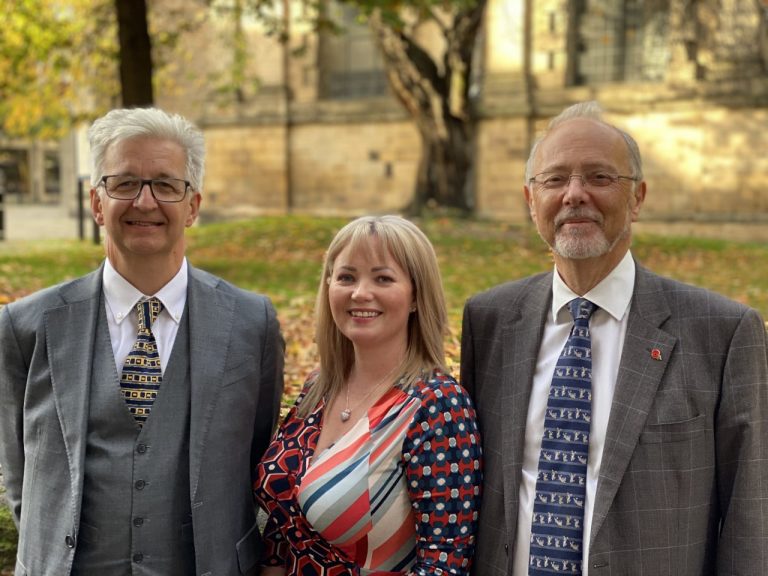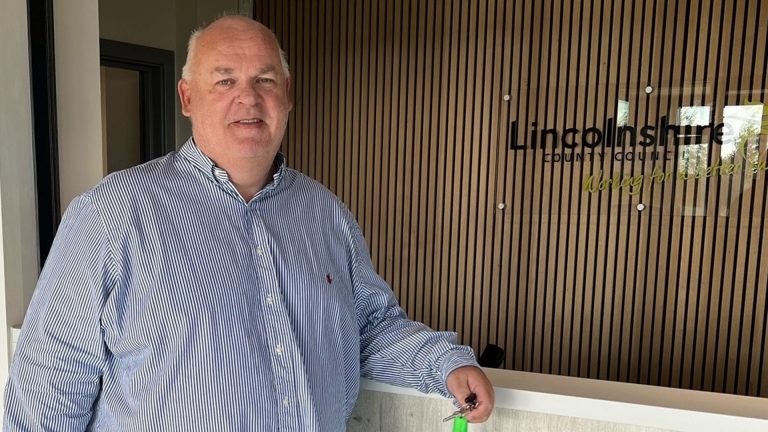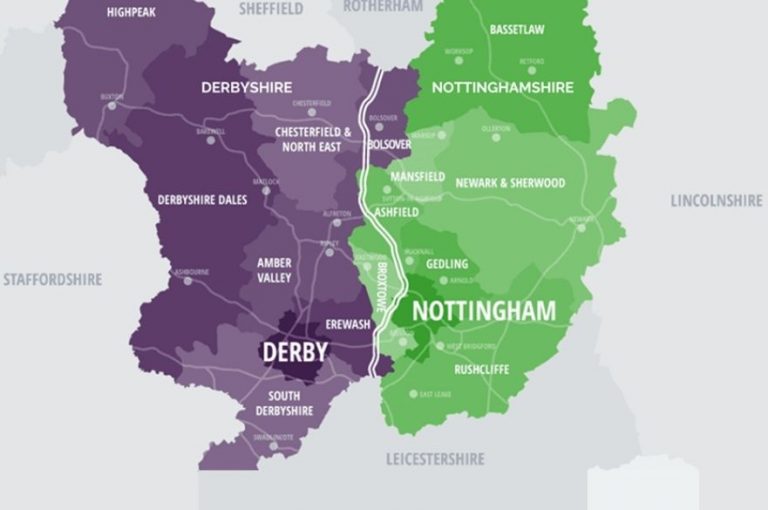Councils across the East Midlands face a collective funding gap of over £181m in the next financial year forcing them to cut essential services, says a report published by Unison.
Waste collections, leisure centres, nurseries and other vital services will all be hit according to the findings based on information* from local authorities in England, Scotland and Wales. The Unison report shows that Leicester City Council is set to have the largest funding gap of all the authorities in the region with a funding gap of £48.3m. The next worst affected authority in the region is North Northamptonshire Council (£25.1m), then Derbyshire County Council (£19.0m) and Lincolnshire district and county councils (£16 m) The record shortfall, totalling £181m across the 40 councils in the East Midlands in 2023/24, means local authorities will be forced to rely on dwindling reserves, and cut services and jobs, says Unison. The report shows there is worse to come with the cumulative funding gap rising even further in 2024/25 to over £360m, says Unison. Unison says skyrocketing inflation, energy costs and the economic impact of the mini budget mean that the actual shortfall will be many times higher. The picture is likely to get bleaker still, says Unison. Chancellor Jeremy Hunt has spoken of further cuts to the public sector, which are likely to compound the crisis in local government funding. And as the cost-of-living crisis deepens and inflation soars, even greater strain will be placed on councils as their costs increase and demand grows for food banks and other support. Unison’s research is based on data relating to 39 local councils across the region. It found that all but four (Chesterfield, Harborough, High Peak and North East Derbyshire) have predicted budget gaps. Most are responding to the crisis by cutting services and activities, examples include: • Derbyshire County Council is closing 8 adult disability centres and 7 authority owned care homes resulting in over 100 job losses. • Nottingham City Council has earmarked five children’s centres for closure, closed a leisure centre in Radford and have cancelled this year’s Bonfire night and fireworks display. Unison says even more services – as well as jobs – will be at risk if councils have to declare themselves effectively bankrupt. Unison East Midlands head of local government Rachel Hodson said: “Local authorities provide the essential services everyone relies on such as waste collection, road repairs, and children’s care. “But cash-strapped councils are having to resort to ever more desperate measures after years of austerity just to keep services going. Now the government looks set to make their predicament infinitely worse with emergency cuts to spending following the mini-budget fiasco. “I have written to all the region’s Conservative MPs to ask them to sort the crisis in local government funding and give councils the cash they need to save services.”Growth sees new starters and promotions at Purpose Media
South & East Lincolnshire Councils Partnership awarded NPO status and £2m funding
Work starts on £2m children’s care home in Lincolnshire
Lindum Group has started work on a £2m children’s care home designed by Kier Construction, Design & Business Services on behalf of Lincolnshire County Council.
East Midlands businesses restructuring to cope with mounting cost pressures
A combination of inflationary pressures, rising interest rates, high energy costs, and ongoing supply chain issues are significantly impacting the financial viability of many businesses, according to new research from Grant Thornton UK LLP.
The business and financial adviser’s latest Business Outlook Tracker found that over a quarter (28%) of mid-sized businesses in the East Midlands have restructured their operations to face these challenges, with a further 48% having plans to do so.
30% of business leaders in the region have already reviewed their headcount due to the impact of rising costs and inflationary pressures, with an additional 36% intending to do so.
The survey recorded that optimism levels from respondents on their business’s funding position dropped to 64%, which is a fall of -28 percentage points (pp) compared to August.
Many businesses in the region are having to secure additional finance to work through the escalating costs facing the market, with 36% already having secured further funding and 38% planning to do so.
The strain on funding has also led to a considerable drop in investment expectations across most areas monitored by the Tracker. The most significant drops compared to the last round in August 2022 were seen in skills development (-33pp), recruitment (-27pp) and employee wellbeing (-23pp). There was also a -19pp drop in the number of businesses planning to increase investment in plant, machinery and new buildings.
But investment looks to be being directed to areas that will have the most impact on reducing costs. Over three quarters (78%) of respondents have already invested, or are planning to invest, in productivity, efficiency and automation.
The number of businesses in the East Midlands that are optimistic about the outlook of the UK economy has also plummeted by –30pp, compared to August 2022.
James Brown, partner and practice leader at Grant Thornton UK LLP, said: “Businesses in the East Midlands are facing a long list of cost pressures, ranging from input cost price increases and high energy bills to rising interest rates and supply chain bottlenecks. All of this means that many businesses are being faced with cost increases from 5% to as much as 100% in some cases.
“The severity of the current market landscape is causing many firms to restructure their operations and review their headcount. While these pressures are going to be with us for some time, there are steps that businesses should be looking at if they’re not already. This includes reducing their debt level to counter interest rate rises, minimising energy usage, looking for efficiencies wherever possible, and considering alternative, cheaper suppliers.
“Right now, many East Midlands businesses will be looking ahead and reviewing their budgets for the next 6-12 months. These forward plans should account for factors that may spring up in 2023, such as the energy bill relief scheme ending, and rising interest costs. Thankfully, I know that this region is full of proactive, agile and dynamic businesses that will take on the challenges and emerge as more resilient, efficient organisations.”
Rotheras to expand in Derby with JH Powell & Co acquisition
Confidence and output growth fall to lockdown levels as recession looms
East Midlands workers name job security and flexible working as top reasons to stay in their jobs
A new survey has revealed that job security and flexible working are the top reasons given by employees in the East Midlands for choosing to remain in their current jobs.
Acas commissioned YouGov to ask employees of East Midlands-based businesses what are the three most important things that are keeping them in their current main job. The poll found that:
- 55% job security;
- 38% flexible working; and
- 33% picked competitive pay and feeling valued, respectively.
Acas East Midlands area director Dwinder Virk said: “Our latest survey gives East Midlands employers a crucial insight into what their employees currently value most in their job.
“For workers in the East Midlands, job security and flexible working are the two main things keeping them in their current roles. One-third also chose competitive pay and feeling valued.
“These findings can help employers when they are considering the types of workplace practices and benefits that aim to attract and retain talent.”
Acas’ advice is that building good staff relations and supporting flexible working can help businesses attract and retain staff as well as increase staff productivity. Flexible working can allow employees to balance work effectively with their personal life and responsibilities.
Leicestershire, Derbyshire and Lincolnshire to receive a share of £17.5m funding boost to spur future growth
“Today’s plans will help get more creative businesses off the ground so they can spread jobs and wealth and help more people, including those from underrepresented backgrounds, break into these world-class sectors.”
Each of the six regions have been awarded £1.275 million in grant funding from the Department for Digital, Culture, Media and Sport (DCMS) to develop a targeted programme of business support. Companies applying for finance will need to demonstrate their potential to grow rapidly and become sustainable through private investment. The investment fund and investor building activities will be delivered by the UK’s innovation agency, Innovate UK. Also announced are seventeen start-up video games studios which have been given grants of up to £25,000 to realise their ideas for innovative new projects as part of the UK Games Fund. The cash injection is for firms across the country with great ideas but lacking in development funding. The fund, which was established in 2015, has received increased government funding of more than £8 million for 2022 to 2025. It aims to help high-potential companies raise new funding, spur economic growth and create new jobs. Games spanning formats from virtual reality to mobile and themes from space exploration to eco-education, with developers based across the country – from Cardiff to Paisley and Brighton to Yorkshire – will benefit from the scheme’s latest funding round.Revival of iconic Derby retail street looming
Multi-million landmark scheme reaches completion in Chesterfield
 Situated in the golden triangle of investment with Chesterfield town centre, Elder Way sits within the recently completed £19.9million Northern Gateway regeneration scheme which comprises a new multi-storey car park, the Northern Gateway Enterprise Centre and large-scale public realm improvements.
Jomast, one of the UK’s leading property development and investment specialists, acquired the famous 1930s, Mock-Tudor building in 2016. It has since developed it into hotel accommodation and the new retail units which are targeted at food and drink operators. The new units complement the upper two floors of the four-storey building which have been operated as a 92-bed Premier Inn hotel since 2019.
Mark Hill, Development Director at Jomast said: “The transformation of the iconic and characterful former department store in Chesterfield has been a labour of love that has created a vibrant new leisure quarter for the town of which we are immensely proud. Interest in the units has been strong and we hope to welcome tenants soon.”
Mark added: “The position and location of the site at times has been challenging but our ongoing collaboration with Chesterfield Brough Council has enabled us to create a premium and attractive business address on Chesterfield’s high street.”
Situated in the golden triangle of investment with Chesterfield town centre, Elder Way sits within the recently completed £19.9million Northern Gateway regeneration scheme which comprises a new multi-storey car park, the Northern Gateway Enterprise Centre and large-scale public realm improvements.
Jomast, one of the UK’s leading property development and investment specialists, acquired the famous 1930s, Mock-Tudor building in 2016. It has since developed it into hotel accommodation and the new retail units which are targeted at food and drink operators. The new units complement the upper two floors of the four-storey building which have been operated as a 92-bed Premier Inn hotel since 2019.
Mark Hill, Development Director at Jomast said: “The transformation of the iconic and characterful former department store in Chesterfield has been a labour of love that has created a vibrant new leisure quarter for the town of which we are immensely proud. Interest in the units has been strong and we hope to welcome tenants soon.”
Mark added: “The position and location of the site at times has been challenging but our ongoing collaboration with Chesterfield Brough Council has enabled us to create a premium and attractive business address on Chesterfield’s high street.”
 Northern Gateway Enterprise Centre, which opened in July earlier this year, already boasts more than 50% occupancy with 17 of the 32 offices now tenanted.
Chesterfield Borough Council is making further investment in the town centre following £20million of Levelling Up funding which, along with additional funding from Chesterfield Borough Council, will transform key event spaces and public areas. The £26million Revitalising the Heart of Chesterfield scheme that will revitalise and better connect key areas of the historic town centre and revamp the Stephenson Memorial Hall. Work has already started and will be completed in phased until 2025.
Elder Way and the golden triangle of investment in the town centre is part of £2billion of regeneration projects currently underway across Chesterfield, which includes the £400million Peak Resort and £340million Chesterfield Waterside developments.
Northern Gateway Enterprise Centre, which opened in July earlier this year, already boasts more than 50% occupancy with 17 of the 32 offices now tenanted.
Chesterfield Borough Council is making further investment in the town centre following £20million of Levelling Up funding which, along with additional funding from Chesterfield Borough Council, will transform key event spaces and public areas. The £26million Revitalising the Heart of Chesterfield scheme that will revitalise and better connect key areas of the historic town centre and revamp the Stephenson Memorial Hall. Work has already started and will be completed in phased until 2025.
Elder Way and the golden triangle of investment in the town centre is part of £2billion of regeneration projects currently underway across Chesterfield, which includes the £400million Peak Resort and £340million Chesterfield Waterside developments.
South Lincolnshire Food Enterprise Zone welcomes first tenant
Moving into new office space was a well-calculated decision for local accountant Tim Burrows, of Station One Accountants.
Cambridge & Counties Bank appoints Patrick Newberry as its new Chairman
Specialist lender Cambridge & Counties Bank has appointed Patrick Newberry as its new Chairman. He replaces Simon Moore, who retired from the Bank after serving 10 years as a Board member.
Patrick joined Cambridge & Counties Bank as Non-Executive Director in June 2021, taking responsibility as Chair of Audit from September 2021. His executive career spans over 30 years with PwC, where his primary focus was on strategy, performance improvement as well as all things regulatory within the financial services and insurance sectors. During this time, he was the lead in major transformational programmes and worked with large financial institutions to set strategy and transform performance. Over the last nine years, Patrick has spent his time as non-executive director and freelance consultant for a number of financial and non-financial services organisations. He is currently on the Board as Chair of the Audit and Risk Committee at Brunel Pensions Partnership, is a Commissioner of Historic England and Chair of its Audit and Risk Committee. He is also Chair of the Cornwall College Group. Patrick Newberry, Chairman at Cambridge & Counties Bank said: “I’m honoured to be taking on the role of Chairman at a time when Cambridge & Counties Bank is continuing to expand its presence across the UK and building on its strong growth momentum. The bank’s tailored approach and deep relationships with clients and brokers allows it to offer a differentiated service and we have seen continued demand across 2022.” Cambridge & Counties Bank announced in June this year that total lending had topped £1 billion for the first time. Originally focused on the East Midlands region, the Leicester-headquartered bank has seen staff numbers increase to more than 200 over the past decade, with major offices now in Sheffield, Bristol, London, and Glasgow.Joules in bridge financing discussions as working capital falls below expectations
Consumers plan for thrifty Christmas as 59% say they’ll have less to spend
More than 80% of UK SMEs want to switch to electric vehicles
2022 Leicester Business Festival begins today
The 2022 Leicester Business Festival (LBF) – one of the regions biggest Business Festival’s ever – begins today [Monday 7th November] with over 80 business events taking place throughout Leicester, Leicestershire and online.
The festival which runs over the next fortnight also coincide with COP27 – the 2022 United Nations Climate Change Conference – themed around protecting the world’s biodiversity for limiting carbon emissions and adapting to climate impacts.
At LBF 2022, climate impact is also featured strongly on the agenda with experts set to highlight real life examples of ways businesses can work towards net zero and be more sustainable. As well as first hand insights from Twycross Zoo on biodiversity there will be a range of expertise from local universities and businesses.
One event which will showcase the race to net zero is ‘Field of Dreams: creating a grass roots net zero football club.’ Taking place on 11 November 12-1.30pm at Heritage House, DMU Campus.
This project involves researchers at DMU who have begun scoping work with Leicester Nirvana Football Club to identify how a team begins the process of decarbonisation. The aim is to help the club become Net Zero in carbon emissions in all aspects of the beautiful game. This includes travel to games, the players’ diets and nutrition, the kits the players wear to train, the clubhouses and lighting, recycling practices and inclusive values. Both teams want to use the SDGs as a framework for collaboration to achieve their visions.
Associate Director of SDG Impact, and Net Zero Research Theme Director at De Montfort University, Mark Charlton said: “This is a very exciting project, whether you like football or not. There are so many aspects to amateur sport that will need addressing as we all work towards a Net Zero future. This is a fantastic opportunity for local businesses to come along and find out more about the actions Leicester Nirvana are taking to reach net zero.”
Other events themed around sustainability include:
-
Navigating net zero: how to overcome the challenges facing businesses
-
Field of dreams: creating a grassroots net zero football club
-
Zero emissions, positive impact -they key actions to reduce your organisation’s carbon footprint
-
Innovation masterclass – helping your business grow, profit and be sustainable
-
Biodiversity conservation opportunities at Twycross Zoo
Tickets are available now and can be secured online at: www.leicesterbusinessfestival.com
Cérélia’s takeover of Jus-Rol hits hurdles with CMA
“Today’s decision is provisional, and we will now consult on our findings and listen to any further views before reaching a final decision.”
The CMA welcomes responses from interested parties to its provisional findings by 25 November 2022 and its notice of possible remedies, which sets out potential options for addressing its provisional concerns, by 18 November 2022. These will be considered ahead of the CMA issuing its final report, which is due by 24 January 2023.East Midlands Chamber announce Leicestershire business of the year
Businesses and community groups to have consultation on £1.14 billion devolution deal
“This deal will bring more and better jobs and opportunities for training, improve the local economy, result in better transport and housing, and accelerate our route to Net Zero. I encourage everyone to take part in the consultation and give us their views on devolution.
“A devolution deal, should it be agreed, would be the beginning, not the end. We’re determined to build on this deal over time, as other areas have done.
- Work towards Net Zero and cleaner air with new low carbon homes, retrofit existing houses with external wall insulation, promote the use of renewable energy, and protect and enhance green spaces, like areas for wildlife and green verges.
- Build on the region’s existing knowledge and expertise in green technology and promote the growth of a future low carbon economy by investing in related skills training at colleges and other training facilities.
- Set up and coordinate smart integrated ticketing and enhanced concessionary fares schemes.
- Work with Homes England to build more affordable homes, by using new powers to buy land and housing (With district and borough council consent).
- Enhance the region’s economy by developing new commercial space to maximise opportunities.
- Work with national government on initiatives to address homelessness, domestic abuse, community safety, social mobility, and support for young people.
- Take advantage of economies of scale by using combined and devolved budgets to deliver more value for taxpayers and more cost-efficient services.






















